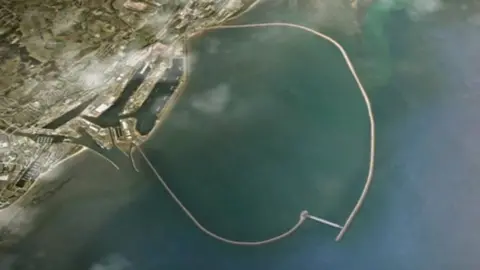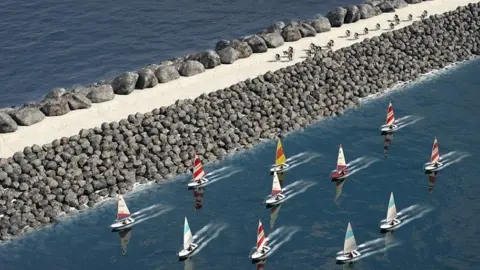£1.3bn Swansea Bay tidal lagoon project thrown out
 TLP
TLPPlans to build the world's first tidal power lagoon have been thrown out by the UK government.
Business and Energy Secretary Greg Clark said the £1.3bn project was not value for money, despite claims by developers Tidal Lagoon Power (TLP) a revised offer made it cheaper.
The decision has been slammed by local politicians across the parties, including the Conservatives.
The scheme off Swansea Bay had £200m backing from the Welsh Government.
But the UK government said it would not pay TLP the fee it wants for energy.
TLP claimed no talks have taken place for more than a year and said supporters of the project have vowed to do what they can to make it a reality.
Mr Clark told the Commons: "Securing our energy needs into the future has to be done seriously and, when much cheaper alternatives exist, no individual project, and no particular technology, can proceed at any price."
Government analysis estimated that the lagoon would cost the average British household consumer an additional £700 between 2031 and 2050.
But TLP chief executive Mark Shorrock said the figures were wrong, adding that offshore wind projects had received £8bn in subsidies and the "path finder" tidal lagoon project needed £25m a year "in order to kick start an industry".
"It's a very, very sad day for Wales, for Swansea," he told BBC Radio Wales' Good Evening Wales programme.
First Minister Carwyn Jones tweeted that it was a "crushing blow to Wales".
Welsh Secretary Alun Cairns said: "I realise the disappointment this decision may cause, but ultimately this project did not meet the threshold for taxpayer value."
There have been a number of calls among Labour MPs for Mr Cairns to go but he told the BBC Wales Today programme he was proud of his record.
Finance Secretary Mark Drakeford, speaking in an interview on Good Evening Wales, said: "Wales has not had an effective voice at the cabinet table."
Plaid Cymru's energy spokesperson, Liz Saville Roberts MP, said the UK government's "decision demonstrates the need for Wales to gain greater control over its own future".
Welsh Liberal Democrat leader Jane Dodds called the decision a "disgrace", as did Gower Labour MP Tonia Antoniazzi.
The announcement brings an end to 18 months of waiting since an independent review, commissioned by the ministers, recommended building the lagoon.
TLP chairman Keith Clarke said: "In light of today's statement and having heard next to nothing from government for two years, the board will be meeting in two days' time to consider its next steps."
The review by former energy minister Charles Hendry said Swansea should be used as a test of the technology, before allowing other developers to bid to construct further schemes as part of a competitive tendering process.
The UK government has been accused of dragging its heels since then, during which time they repeatedly stated the scheme must prove "value for money".
 TLP
TLPTLP claims the Swansea project would provide power to 155,000 properties in Wales and is cheaper than nuclear power.
The developers had previously asked for a 90-year contract with the UK government with an average strike price - a guaranteed price for the electricity generated - of £89.90 per megawatt hour.
The new nuclear power station at Hinkley Point C in Somerset was given a strike price of £92.50/MWh for 35 years.


Analysis by Brian Meechan, BBC Wales business correspondent
This was a project that seemed at one point to have widespread and almost universal support in Wales.
It required the UK government to agree a significant strike price - a subsidy paid by consumers through energy bills - although the exact amount varied depending on the length of time that price was set for and whether other taxpayer funding was invested in the project.
The independent report by Charles Hendry was very supportive of the tidal lagoon. However, it also said that doing a full, value for money, assessment was beyond its scope.
In recent months, some in the business community have been privately raising concerns about the cost of the project and its impact on energy bills.
While Tidal Lagoon Power and the Welsh Government now say it is the same price as nuclear power, the UK government insist it is double.
However, the goalposts have moved. There was huge criticism of the UK government over the price for energy struck for the new nuclear plant across the water at Hinkley Point. With a pledge not to commit bill payers to such costs again, even getting the cost of the lagoon to a similar figure was unlikely to be good enough.
It seems, ultimately, that UK ministers do not have confidence that the lagoon developers are able to deliver the project at the price they now think is reasonable for consumers to pay. Especially as other options such as wind energy come in at a much lower cost.

Tidal lagoon: The timeline
2003: Plans first emerge for a £30m tidal power project in Swansea Bay from a green energy charity
2006: Tidal Electric Ltd prepares a scoping report for a lagoon to take the project on but it is put on hold
2012: Tidal Lagoon Power (TLP) unveils its ambition to develop a breakwater and power generation
2013: TLP starts developing its plans
2014: Plans submitted to Planning Inspectorate with a cost of £850m
2015: Proposals get backing of UK government, subject to subsidy agreement - hope it could be operational by 2018
2016: Report warns of impact on fish. Charles Hendry is appointed to lead independent review into £1.3bn lagoon's viability
2017: Hendry review backs the lagoon as a "no regrets" option but the UK government is still to decide
2018: Delays, mostly believed to be over arguments over value for money. Welsh Government also offers substantial investment, as does Wales Pension Partnership

Ian Price, director of business group CBI Wales, said: "We appreciate the effort and energy made by politicians from both governments who have worked tirelessly to try and make this project a reality. At the end of the day, any project has to be affordable for consumers."
David Clubb, a director at RenewableUK Cymru, the trade body for all renewable energy, said: "This means that the region will not benefit from many thousands of jobs from the project and the associated supply chain."
